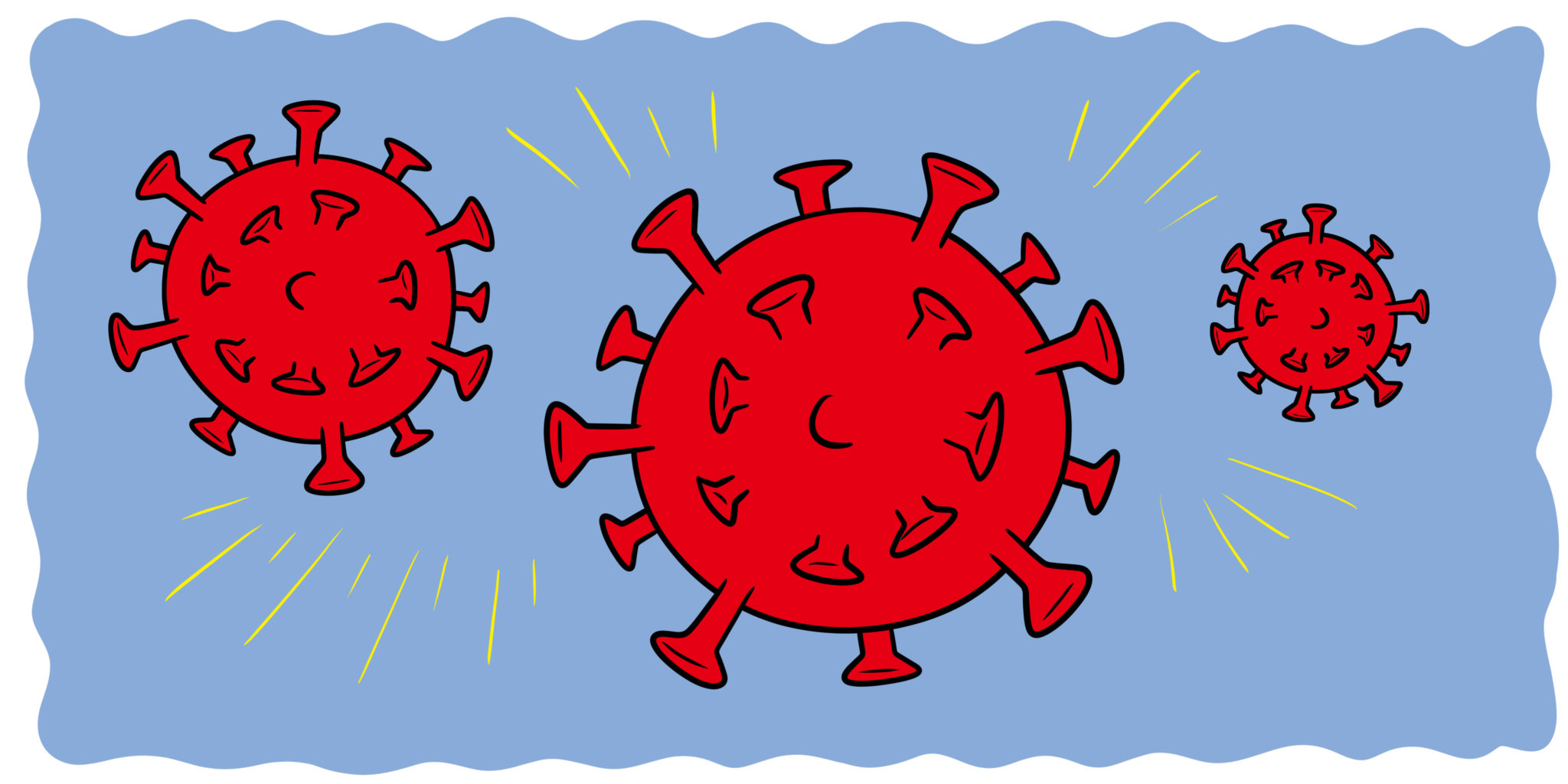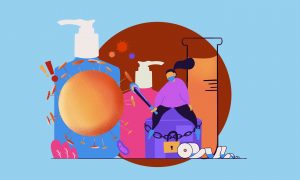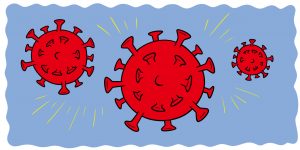This piece appears as part of our On The Pandemic column, featuring commentary about the COVID-19 pandemic from a diverse set of voices.
Previously, going grocery shopping was a simple, mindless task. Now, in a COVID-19 world, it’s quite the opposite, as shoppers don face masks, dodge each other, and wait in long lines. Although some states are slowly loosening social distancing orders, ventures outside the home are still risky.
Our grocery shopping habits during this time of crisis are revealing about human behavior and motivations: shoppers have emptied shelves of toilet paper, hand sanitizer, and food items in a panic-buying frenzy, often depriving others of the ability to purchase household essentials. This type of hoarding seems logical yet illogical at the same time. When there is a public health emergency going on, it’s natural for us to want to secure the wellbeing of ourselves and our family above all else, and many are trying to do this by stocking up on household essentials.
However, during the week of April 10th, Walmart sold enough toilet paper in the span of five days to give every American a roll, indicating that there is more than enough supply. If people acted less on impulse, however, they would recognize that there is no need to hoard. No matter how illogical, panic buying is undeniably appealing to consumers as a means of coping with uncertainty. Even if most people do not intend to buy excessively, the actions of a few overzealous shoppers can easily ripple across communities, creating an atmosphere of anxiety and scarcity. Shoppers may perceive the actions of other panic buyers as a threat to their ability to provide for themselves. The psychological effects of scarcity drive people to view the world with tunnel vision, focusing on short term behaviors that may be detrimental in the long run. This “scarcity mindset” is what leads people to reach for that extra pack of toilet paper. Shoppers are not only buying groceries, but also a sense of security in this turbulent time.
While the root of this behavior can be understood psychologically, Buddhist principles of non-attachment may provide an alternate perspective on the situation. Although I would not identify myself as a Buddhist, I feel connected to it in two ways. First, I am Chinese American, and Buddhism has played a large role in shaping Chinese culture. I have several relatives who do practice Buddhism in China. Secondly, my interest in my cultural background led me to take a course in classical Chinese philosophy at Georgetown, where I learned about Buddhism in much more detail. With my experiences and the current pandemic, I tried viewing our troubles from this new Buddhist perspective. The stressful process of grocery shopping and coronavirus-induced anxiety, in general, may reduce our ability to think clearly, but Buddhism can provide insight into managing our thoughts and actions.
Buddhist philosophy views the world as an ongoing condition of suffering caused by selfish human desires. Accordingly, it aspires towards the ultimate goal of escaping this suffering by extinguishing all desires, achieving an enlightened state known as Nirvana. To achieve Nirvana, Buddhism emphasizes the idea of non-attachment, which means that one does not fixate on any particular thoughts or desires.
Why does Buddhism place such an emphasis on non-attachment, and how does this relate to our lives today? By successfully letting go of attachments, an enlightened person can go through life with a sense of calmness and peace of mind, avoiding getting hung up over negative thoughts or occurrences. Non-attachment is about recognizing what forces in our lives that we can and cannot control. By choosing not to fixate on matters beyond our control, such as the pandemic, we can remain calm when life doesn’t go as planned and face challenges with a better mindset.
Using Buddhist principles to combat the effects of a scarcity mindset may sound complicated and daunting to many–after all, many of us are not practitioners of Buddhism looking to achieve Nirvana. However, this doesn’t mean that we can’t apply some Buddhist tenets to our lives to help improve the grocery shopping situation.
Panic-buying can be understood as an uncontrolled desire for self-preservation, as shoppers are fixated on their emotions of fear and anxiety. When shoppers act on these emotions, their selfish behavior results in suffering because others are unable to buy what they need. From the perspective of one particular school, Chan Buddhism, panic-buying is not an unavoidable outcome; there are ways to avoid the frenzied situation at grocery stores.
Chan Buddhism teaches that everyone possesses “Buddha-nature,” the ability to rise above the desires that obscure our nonattachment and achieve Nirvana. This is done through utilizing mindfulness in our everyday actions. Mindfulness in the context of Chan Buddhism involves recognizing all of our present thoughts and feelings without judgement. By acknowledging our feelings of anxiety without assigning judgement, the process of letting go of these feelings becomes easier, and we can begin to remove the suffering from our lives.
Focusing on nonattachment also allows us to look beyond our own desires and minor irritations, becoming more compassionate and caring for others as a result. Chan Buddhism encourages the cultivation of compassion in conjunction with nonattachment, as it allows us to recognize the suffering of others. As the scarcity mindset shows us, in these uncertain times it’s tempting to seek security for ourselves and our immediate family above all else. It’s not wrong to want to care for ourselves first, but we must acknowledge that we do not exist in isolation–when others suffer, we are affected as well. If anything, the pandemic has shown us the importance of community. It will take collective social distancing measures, the tireless efforts of healthcare workers, and of course, enough supplies and groceries for everyone in order to stop the spread of COVID-19. Exhibiting compassion is one step towards reducing the suffering of others, allowing a stronger community response and a quicker end to the pandemic.
With these Buddhist tenets in mind, the first step to address the shopping habits of consumers is recognizing our current situation through mindfulness. We should be gentle with ourselves and acknowledge our anxiety and fear at the grocery store. We should also recognize what is in and out of our control: we can’t control the existence of the virus, but we can control our reactions to it and contribute to a community that is better able to fight it. As we become more aware of our emotions, this process can aid us in releasing our fixations, clearing our minds and reducing the effect of the scarcity mindset. However, recognition of these feelings is not enough. The next step is to manifest our nonattachment in practice and fully release our fixation on selfish survival instincts. This looks like making and adhering to a grocery list, or buying more purposefully instead of frantically sweeping packages off the shelves. By doing this, we act separately from selfish desires and ensure that everyone in our community has access to enough supplies.
Applying these principles of Chan Buddhism is certainly not an easy feat, especially in the midst of a global pandemic. COVID-19 has made grocery shopping into a sort of zero-sum game: it feels like if we do not stock up, others will and leave us with nothing. Even though the spread of the virus has been slowing in my hometown of Westford, Massachusetts, the continued shortages of kitchen essentials such as flour and rice show that panic-buying is still an issue.
Because of this, an individual change might not seem significant in preventing hoarding, but there is also potential for change at a community-wide level. Chan Buddhism is not only concerned with the enlightenment of individuals, but also the enlightenment of others. An example is a good friend, someone who can guide others to see the Buddha-nature within themselves. For example, if you are struggling to manifest nonattachment, you could benefit from seeing someone else shopping mindfully. Similarly, if someone sees you calmly shopping and buying normal quantities, they might mirror your actions.
Although role models can be helpful, it is still critical to recognize the nonattachment and Buddha-nature within oneself. In other words, we cannot expect ourselves to passively change; we must be mentally poised to receive the message. Therefore, the first step of recognition remains the foundation for shopping with nonattachment.
During this challenging time, it is more important than ever to show our caring for others and help those who are suffering. Shopping more mindfully so everyone has access to essentials is a goal we can all work towards. By first acknowledging everyone’s innate ability to achieve original nonattachment, then acting upon it, we can lessen this ubiquitous panic-buying behavior. Even though it may be difficult to overcome the scarcity mindset, with this knowledge we can start to shift our behavior and that of the people around us. Being conscious of others whilst standing in the middle of the toilet paper aisle may be all that is needed to spark nonattachment, and ultimately, a more caring and compassionate community.





